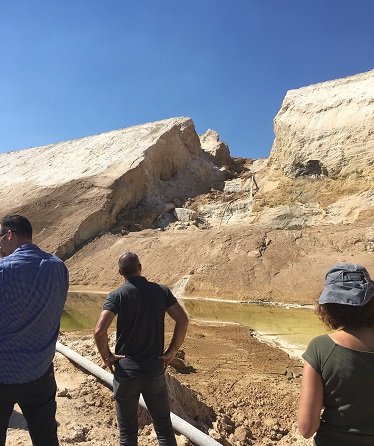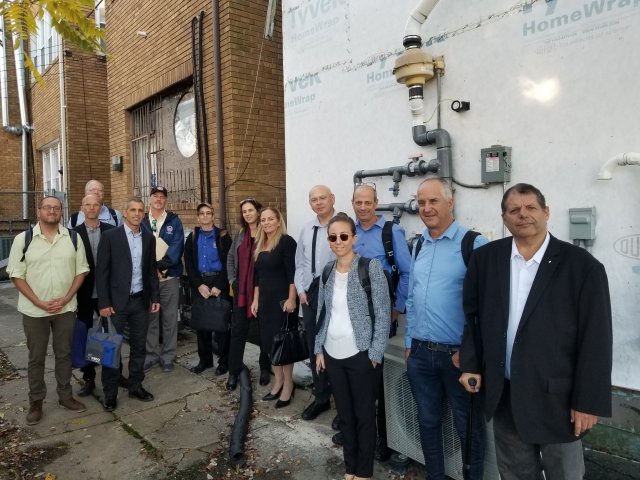EPA Collaboration with Israel
Since 1991, the United States and Israel have engaged in scientific and technical collaboration to protect the environment, by exchanging scientific and technical information, arranging visits of scientific personnel, cooperating in scientific symposia and workshops, and undertaking cooperative research projects concerning problems of common interest.
This work takes place under a bilateral Memorandum of Understanding (MOU) between the U.S. Environmental Protection Agency (EPA) and the Israel Ministry of Environmental Protection (MOEP). The newest iteration of the MOU builds on previously expired MOUs between EPA and MOEP signed in 2012 and 2018. The most recent Memorandum of Understanding (pdf), which was signed by former EPA Administrator Michael S. Regan and Israeli Minister of Environmental Protection Idit Silman in September 2023, advances bilateral cooperation on climate change, water reuse, contaminated site cleanup, and other environmental issues of mutual interest.
Recent News
May 2021: EPA's former Assistant Administrator for International and Tribal Affairs, Jane Nishida, and Israeli Ambassador, Gilad Erdan, provided welcoming remarks for the Israel Water Reuse Virtual Tour Webcast in support of the EPA/Israeli Ministry of Environmental Protection MOU and the National Water Reuse Action Plan. Planned by the Government of Israel (Ministry of Environmental Protection, Israeli Water Authority, and Embassy of Israel in the U.S.), the Water Reuse Association, and EPA, the goal was to further the sustainability, security, and resilience of the United States water resources through sharing polices, practices, knowledge and technologies.
Over 700 people from 49 countries in the regulatory, utility and agricultural communities joined to learn how Israel has accomplished extensive infrastructure, regulatory, and institutional reform to recycle 87% of its wastewater for beneficial uses as a solution to extreme water stress. The three-session tour covered Israel’s water reuse regulatory approaches, case studies, technology, and agricultural irrigation applications relevant to the US perspective. EPA, FDA and USDA moderated a Q&A session at the end of each day.
Explore Our Activities in Israel
- Emergency Response
- Clean-up of Contaminated Sites
- Water Reuse
- Water Cybersecurity
- Energy Efficiency
- Lead Paint
- Agreements
- Partners
- Learn More
Emergency Response

- View the joint paper on clean-up technology evaluations.
In June 2017, approximately 50 million gallons of waste water were released into the Negev Nature Reserve due to a catastrophic failure of the Rotem Phospho-Gypsum Stack in Israel. At the request of MOEP, EPA has provided technical assistance and advice to the Ministry since the spill occurred. In March 2018, the MOEP met with EPA, the State of Florida and Phosphate Industry Officials to review phosphate industry practices and U.S. regulations, and to share technical information. EPA continues to provide technical advice to further the MOEP’s development of an Israeli Phosphate regulatory framework.
Clean Up of Contaminated Sites

Water Reuse
Water scarcity is a growing challenge in the United States and around the globe, with pressures from drought, climate change, population shifts, and aging infrastructure.
Reuse of treated wastewater and stormwater for agricultural, non-potable, or even potable uses provides an alternative source of water that can be more reliable than traditional raw water sources. The capacity to incorporate water reuse into a community's water portfolio can provide resilience against climate-induced impacts and meet communities long-term water needs.
Israel has accomplished extensive infrastructure, regulatory, and institutional reform to recycle 87 percent of its wastewater to address water scarcity issues– quickly becoming a global leader in applying recycled water for agricultural irrigation. The United States currently recycles only about 6 percent of its water, so the United States is learning from Israel’s accomplishments, to further support the sustainability, security and resilience of water resources here at home.
The National Water Reuse Action Plan (WRAP) was developed in collaboration with partners across the water sector. Actions in the plan are intended to drive progress on reuse and address local and national barriers across a range of topics including technical, institutional, and financial. Israel has committed to fostering information exchange with the United States on policy, technology, and agriculture to advance water reuse as part of Action 11.1, Facilitate U.S.-Israel Collaboration on Water Reuse in the WRAP.
Collaborative activities under the WRAP and in support of the Israel MOEP-EPA MOU have included:
- Israel provided a Water Reuse Virtual Tour in May 2021. Over 700 people from 49 countries in the regulatory, utility and agricultural communities joined to learn how Israel has accomplished extensive infrastructure, regulatory, and institutional reform to recycle 87% of its wastewater for beneficial uses as a solution to extreme water stress. The three-session tour covered Israel’s water reuse regulatory approaches, case studies, technology, and agricultural irrigation applications relevant to the US perspective. View Videos from the Webcast
- Israeli Water Reuse experts led a session, "Israel’s Unique Experience with Water Reuse: Policy, Regulation, and Financing" during the Water Reuse Association Virtual Symposium (PDF)(50 pp, 8.8M, About PDF) in September 2020. The 90-minute session highlighted Israel’s experiences with reaching the ability to reuse significant percentages of their wastewater and how those lessons might apply to efforts to implement water reuse in the United States. It also highlighted the National Water Reuse Action Plan.
- Israel and EPA participated in a government-government discussion to share lessons learned and opportunities and water reuse panel to discuss water reuse approaches at the Water Environment Federation’s Conference in Chicago in September 2019.
Water Cybersecurity
EPA’s National Homeland Security Research Center is collaborating with Israel on water security issues, risk assessment and water decontamination. This work is based on the Bilateral Statement of Intent on Security of Water Supply Systems, which expresses the intent of U.S. and Israel to work collaboratively to address present and future water security issues in both countries.
A subject matter expert workshop to identify cybersecurity research gaps and needs of the Nation’s water and wastewater systems sector took place in April 2017.
Energy Efficiency
In an effort to save energy and develop a comprehensive program to improve the energy efficiency of commercial buildings in Israel, EPA is sharing ENERGY STAR approaches to help Israel develop components of its own energy efficient buildings program through workshops and webinars.
-
November 2020: EPA, joined by the U.S. Department of Energy’s U.S. Energy Information Administration and Natural Resources Canada, conducted a webinar to share the U.S. and Canadian approaches to collecting data on the energy use of commercial buildings, and to discuss how MOEP could develop a process to allow MOEP to create an ENERGY STAR Score for Israeli office buildings.
- September 2019: EPA experts travelled to Israel to participate in training sessions with MOEP and Israel’s Ministry of Energy to share an overview of the ENERGY STAR program, details about the program’s Portfolio Manager® energy benchmarking tool, and the statistical methodology used to develop ENERGY STAR scores for commercial buildings in order to help Israel begin planning for development of its own benchmarking tool and building scores. EPA also presented on The Value of Energy Benchmarking in Commercial Buildings (PDF) (32 pp, 3 M, About PDF) to attendees of the Israel Green Building Council’s 8th Annual Conference.
Lead Paint
Lead is an extremely dangerous, toxic metal that is poisonous to humans and particularly harmful to children, causing permanently lower IQs and behavioral problems. The global community has made great strides to reduce the dangers of lead around the world by banning lead in gasoline in almost all countries and banning lead in paint in some countries. However, about 70% of countries still allow lead paint. To address lead paint globally, EPA serves as the Chair of the Global Alliance to Eliminate Lead Paint, a voluntary partnership of governments, industry, and NGO’s to eliminate lead paint around the world. The goal of the Alliance is for all countries to enact laws to eliminate lead paint.
In our role as Chair of the Alliance, EPA has been working since March 2018 with Israel’s Ministry of Health to establish a legal limit for lead in paint. In June 2018, the U.S. Embassy in Israel organized a roundtable discussion in Jerusalem on eliminating lead in paint. Representatives from government, industry, and academia attended the meeting and learned about the adverse health effects of lead in children and adults and the importance of eliminating lead in paint. Following that roundtable discussion, the technical committee at the Standards Institution of Israel voted unanimously to restrict the lead concentration in all paints to 90 ppm, by January 1, 2021.
Agreements
- Memorandum of Understanding (MOU) between the Ministry of Environmental Protection of Israel and the U.S. EPA ( 2023) (pdf) (739 K)
- Bilateral Statement of Intent on Security of Water Supply Systems (2005) (pdf) (997 K)
- Memorandum of Understanding Between EPA and the Ministry of the Environment of Israel (February 1991) (pdf) (2.2 M)
Partners
- Israeli Ministry of Environmental Protection
- Israel Ministry of Health
- U.S. Department of Energy
- U.S. Embassy Israel
Learn More about Israel
- State Department Israel Page
- U.S. Central Intelligence Agency World Factbook: Israel
- EPA's Collaboration with the Middle East
Contacts
For additional information on EPA's work in Israel, contact:
Office of International and Tribal Affairs (2650R)
1200 Pennsylvania Ave., NW Washington, DC 20460
Email: rosen.alex@epa.gov
Phone: 202-564-7114
